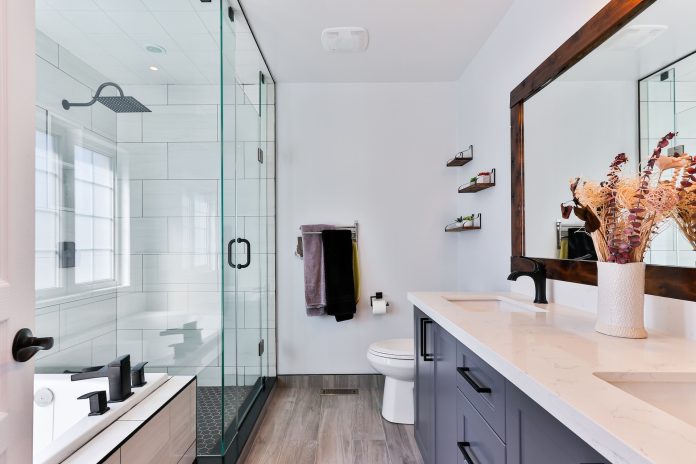Upgrading your kitchen or bathroom can greatly improve your home’s functionality, comfort, and value.
However, taking on such renovations without professional guidance can turn into a stressful and costly endeavor. Hiring an experienced contractor simplifies the process and ensures your project stays on time and within budget.
This guide covers everything you need to know about finding the right contractor for your kitchen or bathroom remodel in the UK.
Assessing Your Needs for a Kitchen or Bathroom Upgrade
Before contacting contractors, take time to determine your needs, preferences, and budget for the renovation. Factors to consider include:
- Layout: Evaluate how you currently use the space and what layout changes would optimize workflow and accommodate your lifestyle. Pay attention to traffic flow, storage, seating, etc.
- Fixtures/Finishes: Make note of the cabinets, countertops, flooring, lighting, ventilation, appliances, sinks/faucets, toilets, showers, and other fixtures needed. Select finishes that fit your aesthetic and are durable.
- Storage: Well-designed storage is essential, especially in kitchens. Consider pull-out shelves, pantries, customized drawers, and other built-ins.
- Budget: Setting a realistic budget prevents overspending. Get quotes on must-have components before determining funds for secondary items. Average costs run £15,000-30,000 for kitchens, £6,000-15,000 for bathrooms.
Get quotes from a reputable kitchen designer London firm like Design and Build. Ask how they handle unexpected changes. Ask them to provide you with an example of a time they had to adjust their schedule.
Finding Reputable Contractors for Your Project
Once clear on your upgrade goals, the next essential step is finding reputable contractors suited for the job.
Good strategies include:
- Getting referrals: Friends, neighbors, realtors etc. having done renovations can suggest contractors they’ve successfully worked with.
- Online review sites: Sites like Trustpilot contain ratings and feedback for local remodelers and builders.
- Checking qualifications: Look for industry certification and membership in trade organizations like CIPHE or Gas Safe.
- Verify insurance coverage: Contractors should carry public liability insurance and provide documentation.
- Request 4-5 quotes: Getting multiple bids allows assessment across factors like cost, experience, time frames etc.
Red flags when vetting contractors include lack of licensing, poor online ratings, refusal to provide references, or quotes substantially lower than competitors.
Consult a UK-based bathroom designer London at London refurbishment company who can assess your space and develop an optimal layout within your budget. Their insights prove invaluable in helping you make the best decision.
Questions to Ask Prospective Contractors
Thoroughly interview 4-5 shortlisted contractors in person before deciding. Key questions to ask include:
- How long have you been in business? Look for 5+ years of experience.
- Can you provide references from past client renovations I can contact?
- What is your specialty or typical job size in terms of projects and budget?
- Will you handle securing all necessary building/construction permits?
- Who will be the project manager and main point of contact?
- What is the anticipated timeframe for project completion? Is the schedule guaranteed?
Document their responses to review and compare once you’ve met with all candidates. Those unable to provide solid answers are likely not the right fit.
Evaluating Contractor Quotes
The contractors you wish to move forward with should provide comprehensive quotes outlining the full scope of work and costs involved. When comparing bids, keep the following in mind:
- Compare across identical project scopes: Ensure you are evaluating expected deliverables across all vendors accurately.
- Understand payment terms: Most contractors require incremental payments tied to project milestones. Be clear on the schedule.
- Ensure quotes are highly detailed: All charges should be clearly itemized. Review fine print for hidden fees.
- Check pricing against industry averages: Unusually high or low bids often correlate to issues with experience and reliability.
- Weigh cost and value considerations: Don’t automatically choose the lowest bidder. Consider expertise, materials used, warranty inclusions etc. that impact overall value.
Quotes including these key details build confidence in the contractor’s capabilities and transparency.
Signing an Agreement
After selecting the best contractor for the job, draft an agreement covering:
- Clearly defined scope of work: Get all details like tasks, materials, fixtures etc. in writing so no assumptions are made.
- Payment terms and schedules: Include payment amounts and milestones like deposit, progress stage completions, final invoice etc.
- Timeline estimates: Agree on start date, expected duration, completion date, and consequences for delays.
- Contingency plans: Address how unexpected issues like damaged materials, budget overruns etc. will be handled.
- Warranties and protections: Ensure workmanship and product warranties plus liability insurance coverage apply.
Never let work commence without a signed contract thoroughly detailing the commitments between you and your contractor.
Preparing for and Managing a Home Improvement Project
Proper preparation and effective coordination after signing will keep your kitchen or bath remodel on a smooth path. Be sure to:
- Declutter space for contractor access
- Protect existing structures with dust screens etc.
- Arrange for temporary cooking and cleaning if the kitchen is impacted
- Establish communication protocol and escalation contacts
- Agree on inspection checkpoints and sign-offs before payment
- Understand change order approvals should modifications become necessary
Staying deeply involved, sticking to the agreed upon timeline, and ensuring the work meets specs are also key to realizing your dream renovation.
Conclusion
If you consult this guide during your contractor search process, you can feel confident you will hire the right pro for your kitchen or bath upgrade needs in the UK. Taking time to thoroughly assess your needs, vet contractors, evaluate quotes, and sign detailed agreements sets up your project for a streamlined experience from start to finish. The investment made will pay dividends through a safer, faster, and less stressful remodel that transforms your home.



 Bitcoin
Bitcoin  Ethereum
Ethereum  Tether
Tether  XRP
XRP  Solana
Solana  USDC
USDC  Cardano
Cardano  TRON
TRON  Lido Staked Ether
Lido Staked Ether  Avalanche
Avalanche  Toncoin
Toncoin